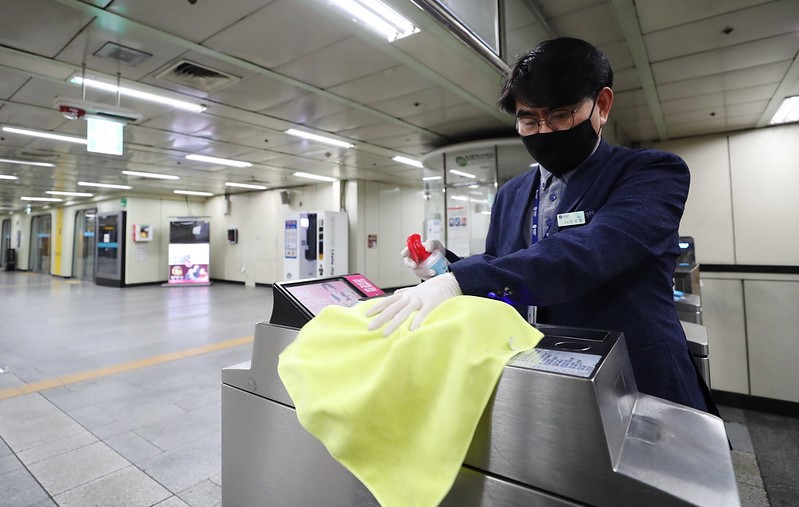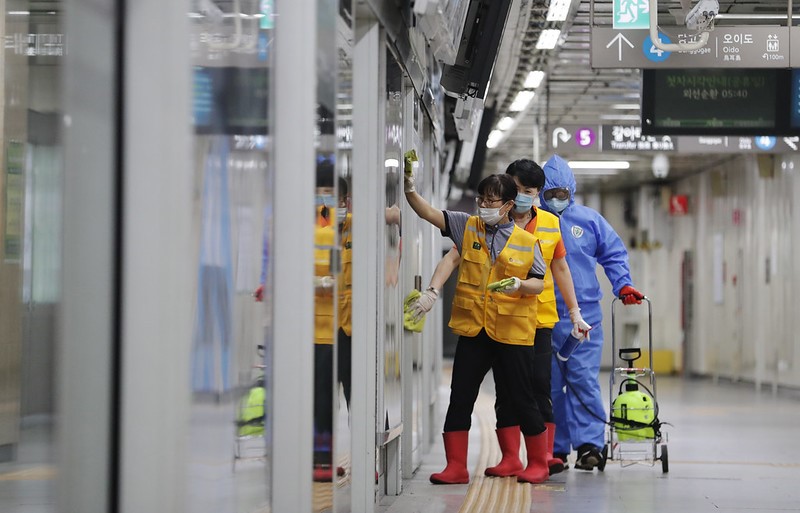
Kim Sung-chul, deputy master of Dongdaemun History and Culture Park Station, on May 7 at midnight disinfects the station's fare gates after the subways stopped running.
By Kim Young Deok and Lee Jihae
Photos = Kim Sunjoo
Seoul | May 7, 2020
"I feel proud of overcoming the novel coronavirus disease (COVID-19) together."
Hyun Byung-ho, a staff member of Seoul Metro Environment Company and chief of the night-shift disinfection team at Dongdaemun History and Culture Park Station in Seoul, said this with a smile. He was wearing protective gear, his glasses foggy and his face running with sweat.
It was midnight on May 7 and the subway ceased operations for the day to allow disinfection at the station. To prevent COVID-19, Seoul Metro shortened subway running hours by one hour on weekdays to allow disinfection preparation from midnight.
Kim Sung-chul, the station's deputy master, checked via radio that all passengers and other people had left the station. Under orders from the disinfection chief to begin work, the seven staff members on the disinfection team busily moved to their respective places.
Wearing protective gear and carrying disinfectants and spray tanks, they quickly walked toward the fare gates at Exit 1. The parts they focused on were the fare gates and fare card machines, the two things most often touched by passengers.
They also disinfected other areas of the station as well, and were thorough in disinfecting and not missing the slightest parts of the fare gates and the card machines.
Kim pointed to the floors around the ticket gate and the fare card machines becoming very wet from the sprayed disinfectant, saying, "We're focusing on the parts most often touched by subway users."
At 12:20 a.m., the staff disinfected the exit stairs and around the escalator. The sweat on Hyun's face was clearly visible and his protective goggles were foggy.
"It's hard to carry on my shoulder a 1.5-kg disinfectant sprayer tank every day, so now I use a handcart to carry the tank," he said smiling. "In the past, we focused on disinfection against pests but now conduct additional disinfection four times a day to ward off infectious disease."
In charge of subway hygiene and sanitation for the past 18 years, Hyun said the notion of disinfection has been modified since the outbreak of COVID-19.

Staff on May 7 at midnight thoroughly sanitize the screen doors of Dongdaemun History and Culture Park Station after Seoul Subway Line 2 stopped running for the day.
The disinfection team headed to the platform 40 minutes later, cleaning everywhere and anywhere passengers could lean on or touch such as benches, handrails and pillars.
The after-hours disinfection took an hour, with staff cleaning the fare gates, stairs, platforms and the entire station.
"Korea will definitely beat COVID-19," said Hyun. "People everywhere are all fulfilling their respective roles."
"Disinfection of a mode of transportation that carries so many people is done daily, so I believe we will definitely defeat COVID-19."
kyd1991@korea.kr